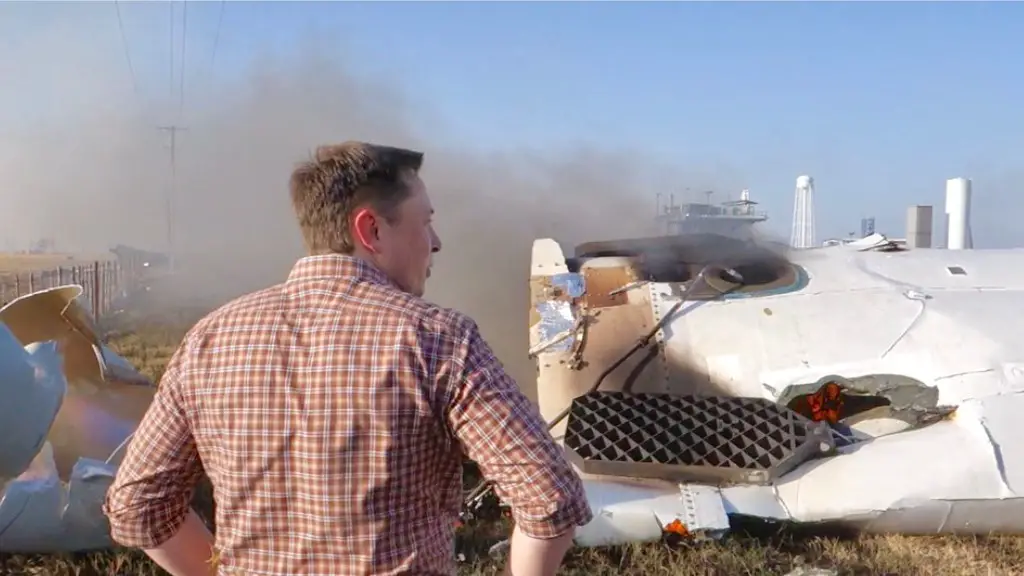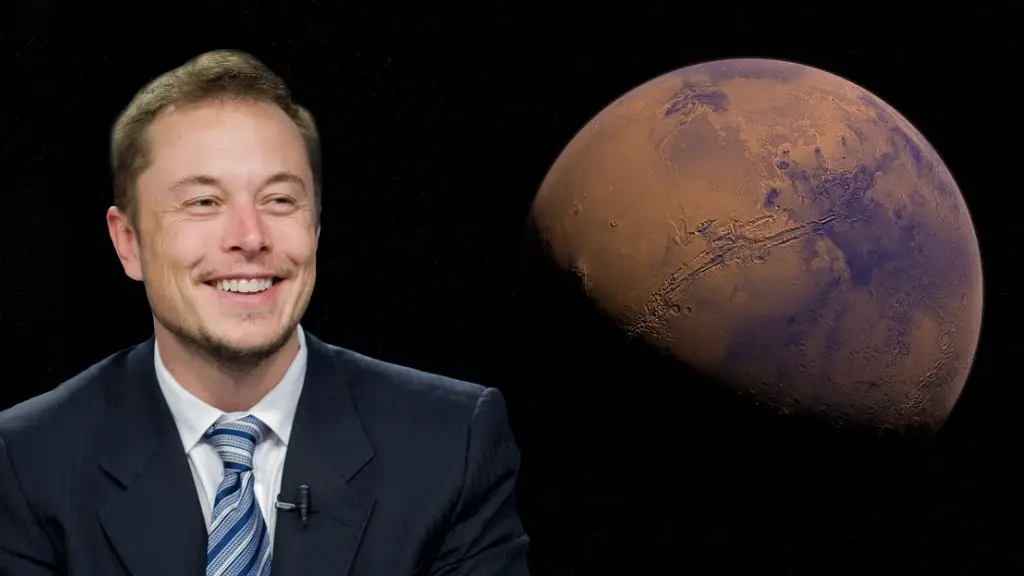Elon Musk, founder of SpaceX and the visionary mastermind behind revolutionizing transportation and energy generation on earth, has now set his sights on a much more ambitious pursuit—mars. Even before SpaceX was a reality, Musk had dreams of establishing a human colony on the red planet, and intends to do everything in his power to make that happen. With SpaceX’s growing success and an increasing number of space programs setting their sights on Mars exploration, his plans are closer to becoming a reality than ever.
The billionaire entrepreneur’s vision for colonizing Mars begins with sending already-existing human settlements to the planet in the form of a Big Falcon Spaceship (BFS). According to Musk’s planned timeline, the space vehicle would launch in 2022, arriving at Mars in 2025. Upon arriving, the spacecraft would transport colonists, supplies, and equipment that they would need to establish an off-Earth human settlement.
Musk has proposed that the settlers use a process known as terraforming in order to make Mars more habitable. This process, which requires the artificial manipulation of the planet’s environment, could involve introducing oxygen and other gases into the Martian atmosphere over time. As a result, the climate on Mars would become more hospitable, and arguably make it more conducive to sustaining human life.
Of course, Musk is not the only visionary aiming to conquer the final frontier. Major aerospace organizations such as NASA are currently running their own space exploration initiatives. The space agency plans to send a manned mission to Mars in the mid-2030s, and despite some opposition over the costs and practicality of the mission, public opinion has been generally supportive.
Moreover, interesting partnerships between aerospace companies and private individuals could be developed in the near future. For instance, Amazon CEO Jeff Bezos launched his own space exploration company known as Blue Origin back in 2000, which he has continuously poured funds into in order to make Bezos’ own dreams of space exploration a reality. Bezos’ company has already propelled several rockets into space, and may be a formidable competitor to Musk’s plans.
Aside from the competitors, Musk will also have to consider the many ethical issues related to space colonization, especially when dealing with a natural environment like Mars. One concern is the possible destruction of its delicate ecosystem, ecological balance, and ancient artifacts. These concerns need to be comprehensively addressed in order for any sustainable off-Earth colonies to become a reality.
Musk’s Potential Solutions For Mars Colonization
While many obstacles still remain in Musk’s journey to create a human colony on Mars, he is actively seeking solutions to make it a reality. Early this year, he laid out a plan to mine oxygen and fuel from the Martian environment. The proposed system would take carbon dioxide from the Martian atmosphere and, using a machine called a Sabatier reactor, convert it into methane and oxygen, which could then be used to power space flights.
Moreover, Musk recently proposed developing a new type of spaceship that could potentially transport settlers to Mars much faster than previous models— without requiring them to remain cooped up in a single vehicle for months on end. The idea for this new spacecraft is to include multiple mini-ships that could each be used to transport smaller groups of people, streamlining the journey to Mars.
Although the many components of Musk’s goals remain a work in progress, SpaceX has already taken strides towards achieving it. The company is currently experimenting with powerful engines and propellant tanks, as well as various parts of spacecraft styles that could be used for Mars exploration. If these experiments are successful, colonizing Mars will be much closer to a reality than ever before.
SpaceX’s Rocket Technology
Musk recognizes that in order to successfully transport settlers to Mars, he will need the most advanced rocket technology possible. That’s why SpaceX has developed the Falcon 9 rocket, which the company claims is the most powerful and reliable rocket on the market. It is powered by nine Merlin engines, and made out of mostly reusable components, which makes it a more economically-friendly option.
Moreover, SpaceX is also developing the monstrous Raptor rocket engine, which is planned to be used for the BFS. The Raptor engine utilizes new and improved technology, including advanced turbopump designs, which allow the engine to be more powerful and efficient than the Merlin. It is also designed to use oxygen and methane as fuel, making it better-suited for missions to deep space, such as Mars.
The Raptor engine also promises to be much safer and less volatile than other engines on the market, which could make space exploration less unpredictable and dangerous. With the introduction of such advanced technology, it’s clear SpaceX is serious about making Musk’s dreams of colonizing Mars a reality.
Environmental Impact Of Mars Colonization
Whether or not Musk’s plans are achievable, concerns remain over the potential environmental impacts of human colonization on Mars. One prominent worry is that settlers could introduce contaminants into the planet’s fragile ecosystem, thereby ruining its pristine nature and driving away native species.
Others worry that the terraforming process could significantly alter the environment, potentially changing the planet’s weather patterns and temperature. This could lead to drastic changes in Mars’ landscape, some of which could be potentially harmful to any species living on the planet.
Musk’s plans could also upset natural processes on the planet. For instance, hydrocarbons on Mars have great potential for various scientific uses, and are a vital component of its planetary life cycle. If settlers begin to mine those materials, it could significantly damage the planet’s interconnected systems.
To mitigate these concerns, Musk and his team have proposed to source energy from renewable sources, as well as utilizing water from the Martian polar ice caps for both drinking and energy needs. Additionally, the team has stated that building on top of Martian rock formations would be preferable to destroying them. This could reduce the potential environmental impact, though more detail is needed in order to make sure the planet remains unharmed.
Economic Impact of Colonizing Mars
The colonization of Mars will also carry drastic implications for the global economy. While it is difficult to predict the exact economic implications, it is clear that Musk wants to make the cost of space exploration more affordable and accessible. On Earth, many struggle to find the funding for space exploration, so a significantly cheaper option could open the door for more people to explore the final frontier.
Of course, the economic implications on Mars itself is not yet clear. It is uncertain if the planet will become self-sufficient and capable of sustaining itself, or if it will need external resources from Earth. In addition, the type of jobs individuals on Mars will carry out is unknown, as well as how much they will be compensated.
Ultimately, the colonization and terraforming of Mars will be a major undertaking and a risky venture. Different individuals and organizations will need to carefully consider the ethical, environmental, and economic implications of this mission in order to ensure it is successful in the long run.
Mars As A Strategic Ally
Another possibility for the colonization of Mars is that it could become an ally for future strategic military and technological purposes. A human presence on Mars could be used to expand access to crucial minerals that cannot be found on Earth, as well as provide a space for the long-term storage of nuclear weapons. This could substantially affect the balance of power in the world and could have wide-ranging implications for the future.
Additionally, the construction of military bases on Mars could have the potential to accelerate space exploration efforts and could potentially be used to extend the US military’s presence beyond Earth. However, this would carry significant costs, and could create political tension if other nations are left out of the decision-making process.
Regardless, Musk’s ambitions for Mars colonization are clear. The billionaire entrepreneur’s dreams of human settlement on the red planet are closer than ever before, and his goal of making space exploration an accessible and economical option could change the way we view space travel in the coming decades.
Possibility of Tourist Missions to Mars
Musk has also flagged the possibility of sending space tourists to Mars on tourist missions. This could be a lucrative source of revenue for SpaceX and many companies that would be involved in the project, as the costs of space travel could be significantly lower than for previous space missions. It would also provide an incentive for the general public to invest in space exploration, potentially driving more resources and attention to further space exploration efforts.
However, the real feasibility of such a mission remains debatable. Currently, the technology used for space travel is extremely expensive, making it only accessible to those with significant sums of money. It also remains to be seen if the average person will be comfortable enough with the risks involved to make the journey, such as radiation that cannot be blocked out by a spaceship’s walls.
Furthermore, the danger of a spaceship failure is always present in any space mission, and if something were to go wrong mid-journey, the consequences could be catastrophic. A catastrophic event on a tourist mission would likely spell disaster for many in the space industry, which means safety must be a priority in any potential tourist mission.
Commercial Exploitation of Mars
Aside from a few individual businesses that could be part of the colonization, many large corporations also have their sights set on Mars. These include major businesses like Boeing and Lockheed Martin, who seek to capitalize on the colonization of the red planet. They are eager for opportunities to send resources, tools, services, and personnel, which could prove to be a major financial boost both for the companies and local economies.
Though the long-term economic implications of Mars colonization is uncertain, large corporations may be able to use the planet for activities such as the extraction of resources and energy production. This could cause tension with proposed local settlers who may want to preserve the planet’s delicate ecosystem, making it a delicate balance to maintain.
Furthermore, other issues such as who will get to own property and resources on the planet remain unresolved, making the whole process even more uncertain. With these questions unanswered, it is difficult to determine what role corporations will have in the colonization of Mars.
Conclusion
Elon Musk’s plans for colonizing Mars have enormous implications and it remains to be seen if his ambitions can be realized. He faces a variety of regulatory, economic, and technological obstacles, not to mention the ethical implications that come with this objective. Still, Musk’s ambition appears to be drawing closer than ever, and the technology and partnerships that have been developed thus far may have set the stage for a successful Mars colonization.




